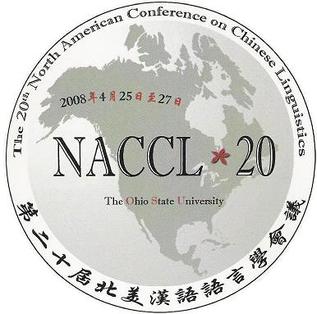The following outline is provided as an overview and topical guide to linguistics:
Cognitive science is the scientific study either of mind or of intelligence . Practically every formal introduction to cognitive science stresses that it is a highly interdisciplinary research area in which psychology, neuroscience, linguistics, philosophy, computer science, anthropology, and biology are its principal specialized or applied branches. Therefore, we may distinguish cognitive studies of either human or animal brains, the mind and the brain.

The Linguistic Society of America (LSA) is a learned society for the field of linguistics. Founded in New York City in 1924, the LSA works to promote the scientific study of language. The society publishes three scholarly journals: Language, the open access journal Semantics and Pragmatics, and the open access journal Phonological Data & Analysis. Its annual meetings, held every winter, foster discussion amongst its members through the presentation of peer-reviewed research, as well as conducting official business of the society. Since 1928, the LSA has offered training to linguists through courses held at its biennial Linguistic Institutes held in the summer. The LSA and its 3,600 members work to raise awareness of linguistic issues with the public and contribute to policy debates on issues including bilingual education and the preservation of endangered languages.
The Chicago Linguistic Society is one of the oldest student-run organizations in the United States, based at the University of Chicago. Although its exact foundation date is obscure, according to Eric Hamp it is generally believed to antedate the Second World War, and possibly extends back to Bloomfield's and Sapir's tenure at the University in the 1920s and 1930s.
In linguistics, linguistic competence is the system of unconscious knowledge that one knows when they know a language. It is distinguished from linguistic performance, which includes all other factors that allow one to use one's language in practice.
Arnold Melchior Zwicky is an adjunct professor of linguistics at Stanford University and Distinguished University Professor Emeritus of linguistics at the Ohio State University. The Linguistic Society of America’s Arnold Zwicky Award, given for the first time in 2021, is intended to recognize the contributions of LGBTQ+ scholars in linguistics and is named for Zwicky, the first LGBTQ+ President of the LSA.

LACITO is a multidisciplinary research organisation, principally devoted to the study of cultures and languages of oral tradition.
Andrew Carnie is a Canadian professor of linguistics at the University of Arizona. He is the author or coauthor of nine books and has papers published on formal syntactic theory and on linguistic aspects of Scottish Gaelic and Irish Gaelic. He was born in Calgary, Alberta. He is also a teacher of Balkan and international folk dance. In 2009, he was named as one of the Linguist List's Linguist of the Day. From 2010-2012, he has worked as the faculty director of the University of Arizona's Graduate Interdisciplinary Programs. In August 2012, he was appointed interim Dean of the graduate college. From 2013-2022, he worked as the Vice Provost for Graduate Education and Dean of the Graduate College. In that role he founded the University's Graduate Center, established the university's Graduate faculty, significantly increased student diversity, and worked to establish better working conditions and wages for students.
Sociocultural linguistics is a term used to encompass a broad range of theories and methods for the study of language in its sociocultural context. Its growing use is a response to the increasingly narrow association of the term sociolinguistics with specific types of research involving the quantitative analysis of linguistic features and their correlation to sociological variables. The term as it is currently used not only clarifies this distinction, but highlights an awareness of the necessity for transdisciplinary approaches to language, culture and society.
Harmonic grammar is a linguistic model proposed by Geraldine Legendre, Yoshiro Miyata, and Paul Smolensky in 1990. It is a connectionist approach to modeling linguistic well-formedness. During the late 2000s and early 2010s, the term 'harmonic grammar' has been used to refer more generally to models of language that use weighted constraints, including ones that are not explicitly connectionist – see e.g. Pater (2009) and Potts et al. (2010).

The North American Conference on Chinese Linguistics (NACCL) is an annual academic conference that focuses on research in Chinese language and linguistics.
Linguistics is the scientific study of language. Linguistics is based on a theoretical as well as a descriptive study of language and is also interlinked with the applied fields of language studies and language learning, which entails the study of specific languages. Before the 20th century, linguistics evolved in conjunction with literary study and did not employ scientific methods. Modern-day linguistics is considered a science because it entails a comprehensive, systematic, objective, and precise analysis of all aspects of language – i.e., the cognitive, the social, the cultural, the psychological, the environmental, the biological, the literary, the grammatical, the paleographical, and the structural.
The Association for Laboratory Phonology is a non-profit professional society for researchers interested in the sound structure of language. It was founded to promote the scientific study of all aspects of phonetics and phonology of oral and sign languages through scholarly exchange across disciplines and through the use of a hybrid methodology. The founding and honorary members are Amalia Arvaniti, Mary Beckman, Cathi Best, Catherine Browman, Jennifer S. Cole, Mariapaola D'Imperio, Louis M. Goldstein, José Ignacio Hualde, Patricia Keating, John Kingston, D.R. Ladd, Peter Ladefoged, Janet Pierrehumbert, Caroline Smith, Paul Warren and Douglas Whalen. The Association is an international body open to scholars world-wide, and currently has over 100 members.
The West Coast Conference on Formal Linguistics, or WCCFL is an annual linguistics conference, usually held in the spring, at a university in western North America. Research presented there can focus on any aspect of natural language analysis, including, but not limited to, phonetics, phonology, morphology, syntax, semantics and discourse structure. Along with NELS, it is one of two major U.S. regional conferences that focus on general linguistics, with an emphasis, in recent years, on syntactic topics.
Heather Goad is a Canadian linguist. Her research explores areas of phonology and language acquisition, especially investigating the shapes of phonological systems, including contrasts in English, French, Korean, Portuguese, Italian and Nepali, as well as the developmental paths of acquiring speech sounds by first and second language learners.
Deborah Sue Schiffrin was an American linguist who researched areas of discourse analysis and sociolinguistics, producing seminal work on the topic of English discourse markers.

The Institute of Linguistics of the Russian Academy of Sciences is a structural unit in the Language and Literature Section of History and Philology Department of the Russian Academy of Sciences. This Institute is one of the major centers in the field of linguistic research in Russia, and is also a center for the Moscow School of Comparative Linguistics.
Catherine Ringen is an American phonologist and professor emerita of linguistics at the University of Iowa. She is best known for her research on vowel harmony, especially in Finno-Ugric languages, and on laryngeal contrasts in obstruents, in particular in Germanic languages.
Henk van Riemsdijk is a Dutch linguist and professor emeritus at Tilburg University.
Alfred (“Al”) D. Mtenje is a professor of Linguistics at the University of Malawi. He is known for his work on the prosody of Malawian Bantu languages, as well as for his work in support of language policies promoting the native languages of Malawi.


